Interview via CVLT Nation
Musician, composer, artist and survivor are just a few words you can use to describe Kristin Hayter. Performing under the name Lingua Ignota, she creates a live show which has been unanimously described as an exorcism. Her mix of choral, black metal, industrial, classical and doom metal makes for an indescribable genera. She is a survivor of both a physically abusive relationship and anorexia, so she uses her voice and music as an art form to express rage, vengeance and fearlessness. Her latest album, “All Bitches Die” (Profound Lore Records) takes you on a spiritual journey to hell and you might feel like you are in the depths of an old Fulci movie. Artist like her are rare nowadays and audiences are known to leave her show in tears. I used this interview to let Kristin tell us her feelings about religion, her past relationship and her interaction with fans. She is the hero we all need.
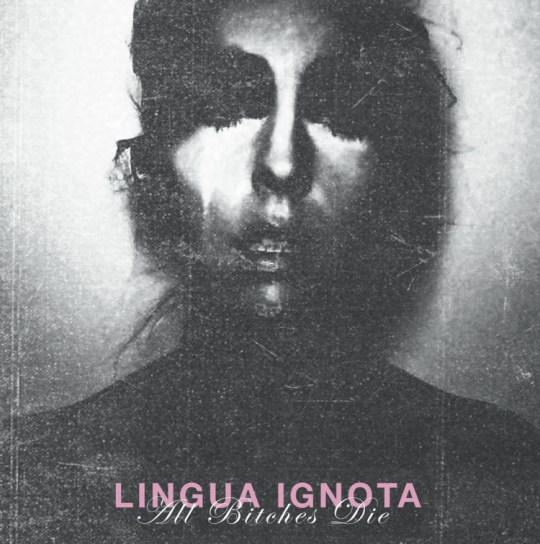
CN: Your live performances are epic, and you often have referred to them as your body going through an exorcism. It is clear that raw feelings and thoughts are coming out of you. What was it like the very first time your performed your own music? Did you expect that your performance would be so physical and emotional?
KH: I’ve been performing since I was maybe 8 years old beginning with church, but I think the first time I performed this particular music in front of people I was completely terrified and I feel like I probably sucked? It took me a while to balance the physical/emotional/technical aspects of the work; ostensibly I have to be able to sing well and with skill while still being semi-dissociated enough for it to be ecstatic or real, so over time as I become more comfortable with achieving that state the way I am a body in the room has changed. I feel like the movement used to be very intentional and referential, because the first iterations of this music were based on Stravinsky’s Rite of Spring and movement-wise I drew a lot of inspiration from Pina Bausch’s angular, violent interpretation of that. But these days I create situations of precariousness and entanglement, where certain things or everything could fall apart. I’ve started using utility lights in the sets, I drag them around and swing them and smash them, and during the last show of tour the lights got tangled so badly all the equipment came unplugged and the set ended abruptly, so I screamed at everyone unamplified and flipped everything over and tore apart all my gear and then was just overwhelmed by emotion and hyperventilated off-stage. Didn’t see that coming and don’t know if it was good but that’s what happened, and I really like experiences like that where no one in the room knows what’s coming next, it facilitates a lot of tension.
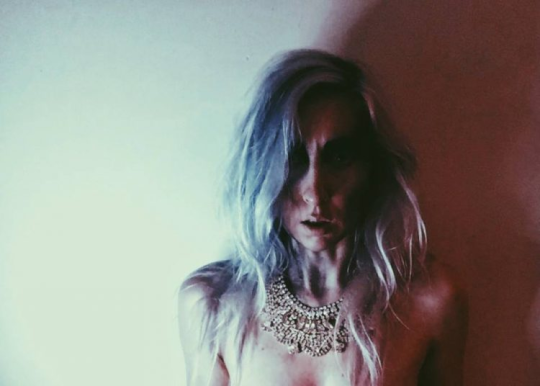
Describe what your song writing process is. Does the music come first or the lyrics? Do you find writing your own music and lyrics to be difficult?
KH: Usually the text comes first. Often the words are appropriated from another source and dramatically re-contextualized. When the text is, perhaps, biblical, it makes the storytelling allegorical, less confessional, and creates a degree of separation that allows me to work with pain in a less intimate way. I try to figure out what kind of sound world or timbres will be a nice counterpoint to the text, or what will augment it. I think about everything in the work being in service of the content or the message and how that content can be expressed in a compelling way, so for instance, if it’s a piece of very brutal and violent text, maybe an arpeggiated piano melody that gives a lot of space to the language will be most effective instead of burying the language in noise or a heavy beat. The text is often sort of allegorical and not a direct transcription of any particular experience. “He beat me until my teeth were scattered like pearls across the red red ground,” gives anachronism and poetry to what may actually have been: “he slammed my hand in a dresser drawer when I went to get a t-shirt, he threw me down on the bed, pinned me there, hitting me, and broke my wrist when I tried to get away, I ran outside and sobbed on the sidewalk, eventually a little girl from next door came out to me and asked if I wanted to have dinner with her family instead.” That’s somehow much more difficult to say, and even now almost impossible to write, so I put that in a different world, with different sounds. I have to create a reality divorced from mine for the music to exist in.
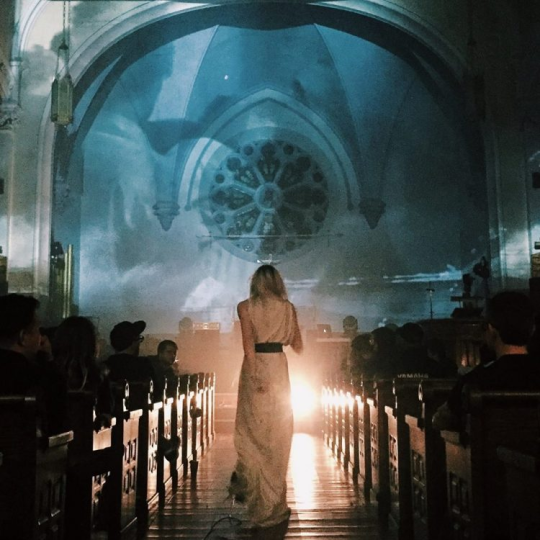
You were raised Catholic and did go to Catholic school for a period. I personally had a difficult time in Catholic school and have related to the way you described feeling out casted once you entered public school. Discuss what your feelings are towards organized religion and do you identify with any particular religion nowadays?
Parochial school is a very specific kind of torture, right? It made me into an atheist, and for a long time I was extremely opposed to organized religion and to the concept of God, and felt that God had abandoned me. It took me a long time to get here, but today I’m a self-loathing semi-practicing Catholic, it’s complicated. I’ve always had a really strong affinity for spaces of worship, art and music of worship, and I love the pageantry and theatricality of catholicism, the kind of twisted materialism. I feel like organized religion is capable of such beauty and also capable of such evil and destruction, of fanaticism and abuse, and that God can bring either light or darkness depending into whose hands God falls; that’s a part of the work also. There’s a small contingent of Catholics in our community of music and we’re all very neurotic. I met so many people on the road who were also Catholic, or lapsed Catholics. And I met a few people who were raised Catholic, but who are trans or queer and felt shunned by their religion, but said that my music provided an opening, or a way to hear a hymn, and I feel deeply indebted to that response.
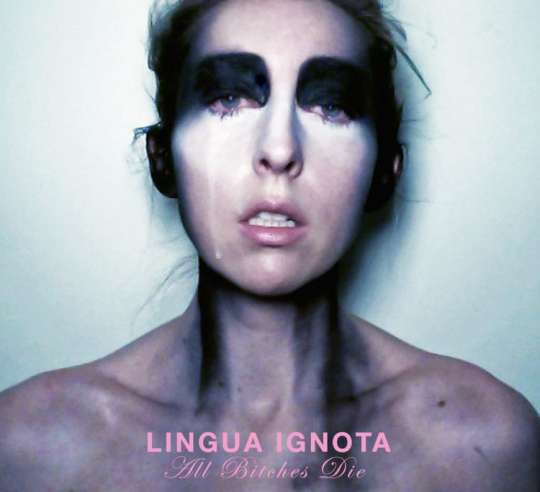
You are currently working with Profound Lore records, and given all the genres that your music draws inspiration from it seems like this is a natural fit. How did this partnership happen? What is it about this label that made you comfortable?
My bud Dylan from Full of Hell turned Chris Bruni on to All Bitches Die, and Bruni sent me a message telling me how amazing he thought it was and asked if I was working on something new. One of my stipulations in working with a label was that I needed Bitches on vinyl, and he agreed to that pretty much immediately, and lo and behold there it is out in the world now! Bruni and I have a great rapport and talk openly and often about pretty much anything, he’s been nothing but respectful and supportive of my vision and super easy to work with.
Honestly, when he approached me I was kind of floored, I hadn’t thought that I would be on Profound Lore’s radar; it’s a label that is home to some seminal extreme stuff. I’m obsessed with Portal and Dalek, I love Full of Hell, Bell Witch. My work is also extreme in a way that made other labels uncomfortable, or I didn’t really encounter another label of Profound Lore’s caliber where it wasn’t implied that I would need to tone it down. Chris employs an art-for-art’s-sake curatorial approach, and puts out work he thinks is challenging. There’s a lot of progressive interesting music in that catalog, but like most extreme labels there is also work from people that I don’t agree with ideologically. I feel that my approach is to reframe and reclaim and often to hold space with my values, which I think are pretty clear.
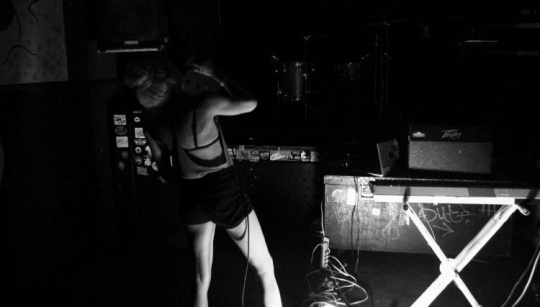
Do you find being a female artist, especially one as intelligent and strong as you, easy in the underground music world? Are you generally treated as an equal or are there moments when you have to deal with sexism, catcalling, or misogyny?
I mean, woof. Sometimes I’m like, oh it’s fine, I will rain destruction upon everyone, and other times I’m like no fucking way I can’t do this.
None of this is in any way unique to me, this is just how it is for a lot of us, but in the time since I started making this music I’ve been abused, called out abuse to avoid silence and had to scream for months to be heard, been dismissed and talked down to, been pursued and hit on in totally unacceptable ways, threatened, stalked, etc. You keep going. It’s fucked and there’s nothing you can do but you keep going, and hope you’re resilient enough to keep going when it happens again.
Yet it’s very important for me to maintain constant awareness of the privilege I have. I’m white, cis, well-educated, etc. As well: decades of work and sweat and blood from the queer community, women, POC, DIY and punk scenes, have made it possible for me to do what I’m doing. There are many many people who are extremely talented, smart, and have so much to say, and labor and suffer intensely to say it, and yet they might never achieve the visibility I have even right now, and I think artists with privilege need to help pull other people up who deserve to be seen. I’m mindful I need to do better.
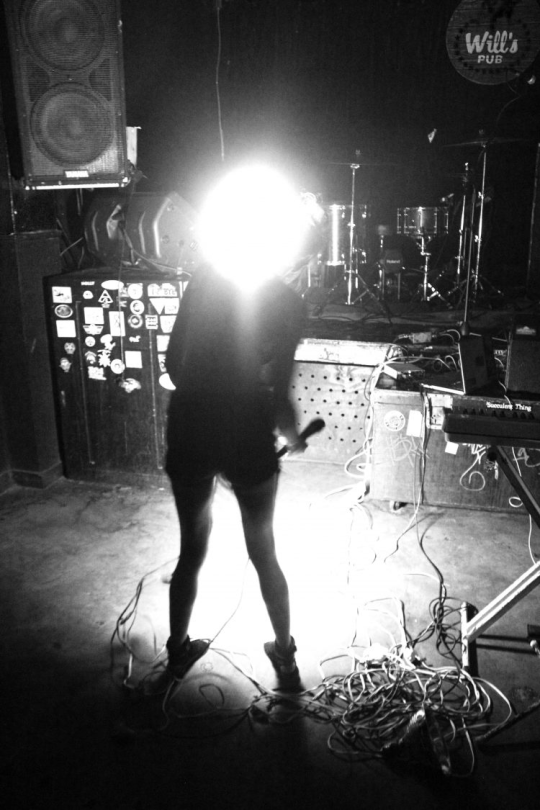
The song “All Bitches Die” is lyrically and musically intense. Calling women bitches and sinners in the same song, describing incidents of the domestic abuse you endured and survived. Did you write this during your relationship with your abuser or after? Do you have a lot of women tell you that your music has helped them through similar situations?
In that particular relationship there would have been no way in hell I could have made this work, I was in a position where I was being totally isolated and controlled, and anything that looked like disobedience or trying to somehow acknowledge the abuse would have resulted in very bad things happening to me. Making music just for school, or just getting to a class was difficult enough; he would drive me to and from and if I was three minutes late, or if I shut the car door too loudly, or I seemed excited about something i had learned, or was wearing the wrong thing — I would be punished, and I never knew what the punishment would be or when it would come.
I do have people share their stories and tell me that the music resonates with them, I have people who say the music helped them articulate a certain anguish, and it is not just women, or cis women, or abuse survivors. I think people can hear that the work is about honest pain and hear themselves in it then. It is absolutely the most humbling thing, a great honor, and I know I have a responsibility as an artist to do right by these people who open up to me or who connect to my work through their pain. My personal suffering is not greater than anyone else’s even though the allegorical speaker in my work is one of singular suffering. Survivors, all of us, are a community and we need to have each other’s backs. I can’t tell you how much it means for us to share space. I am realizing that, even though I want to die every day, I’m trying to stick around. People want me to succeed because they see themselves in me.
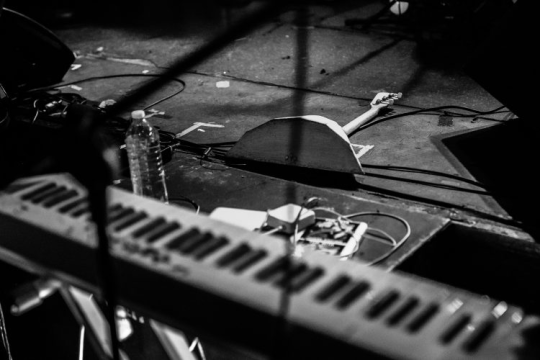
Do men make you uncomfortable after what you have survived? I assume not as you work with several men and you have a clear vision and control as to how your art is presented. Have you found peace with what you have been through? What is the best way to help someone who is going through a similar situation or someone that is a survivor?
I am insanely fearful of all people: guarded, mistrustful, and I fully anticipate that everyone close to me will betray me. At the same time I still have to be a person in the world who functions in a day, who can laugh at a joke. I have a very masculine personality and can hang with men easily, and some of my closest friends are men. Separatism, for me, is unproductive; my work is less about hating men and more about elevating the survivor’s voice, and men, if change is going to happen, need to hear that voice. I’ve accepted that peace may not be in the cards for me. I think instead of personal happiness I’ve found my purpose in the music, and this is the way I get to reach out to people.
The best way to help a survivor is to believe them. Survivors are invalidated in the most profound and painful ways. Listen to them, Believe them, Ask what they need, and do it.
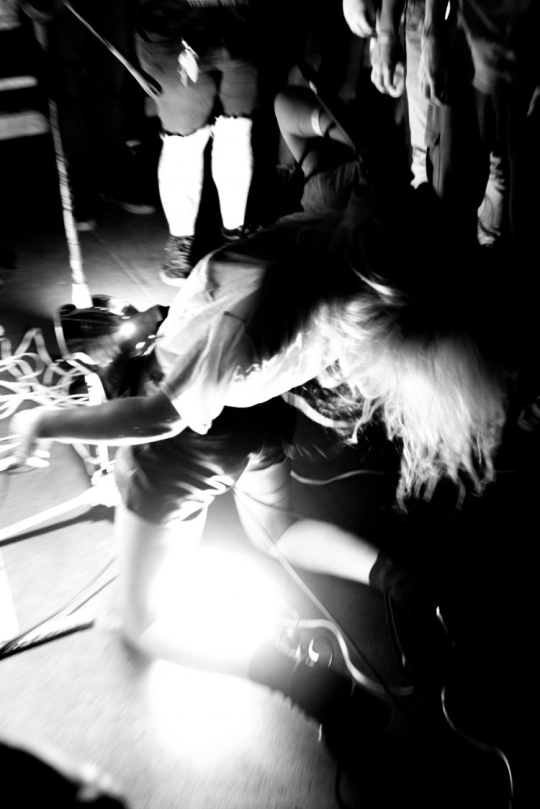
Do you enjoy touring? Have you had any strange or memorable situations happen you can share with us?
I love tour and plan to tour a lot going forward. I think I don’t play typical sets so I don’t get typical responses. There are sets that erupt in crazy applause and there are sets that end with silence and people in tears or discomfort or misunderstanding or confusion or bemusement. I am very lucky to be able to tour with The Body, really special and wonderful friends, truly the best people, so generous and kind, who’ve been doing it a long time and only keep people around them who don’t suck, so I got to meet a lot of cool folks on this tour. We played a bunch of shows with Big Brave and they are so nice and such a good band and killed it every night. False, Thou, many others: great bands great people.
As far as the shows, In San Francisco there was a civilian style bro who unwisely chose to stand directly in front of me and talk through the whole set, and started yelling when the set got loud. I was like, ok, you want to be part of it you’re going to be part of it. I screamed in his face, blinded him with lights, and circled him to tangle him in cables and basically hogtied and tripped him. I mostly don’t want to touch anyone during my set but that was very satisfying. In NOLA people started chanting “Aileen” in salute to Aileen Wuornos when they heard her voice in the set. I got a lot of cool presents! My new friend Winslowe Dumaine flew from Chicago to Portland to give me an incredible tarot deck he created called the Tarot Restless, and said my music was important to him in its making. People made me pieces of art and showed me their sketchbooks or poetry, a real nice person gave me a velvet dress. A bachelorette party came to the LA show and they were the coolest, I don’t know it’s crazy! I’m just trash!
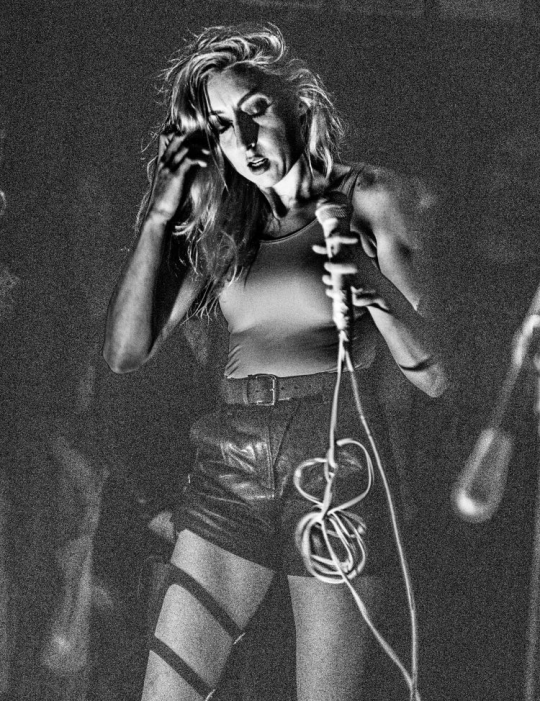
Do you like interacting with fans before and after shows? What is the best way to approach you?
“Fans” is such a bizarre concept to me, honestly I’m a regular guy and I have no idea why anyone would want to talk to me in any context, but it really does mean a lot to me. I love to connect with people who show up for my work, everyone is so nice mostly, and it’s such an honor that people share their experiences with me. Sometimes people approach me within like 5 seconds after I’ve stopped playing and i tend to be kind of incoherent and crazed at that point, but generally I’m down to meet people at any point if they want to say hi.
What are the things that make you happy?
Jelly Beans, Extra Toasty Cheezits. Nostalgia by Tarkovsky. The first Home Alone. Bach. A nice church with no one in it. Bachelor in Paradise.
LEARN MORE ABOUT LINGUA IGNOTA:
https://linguaignota.bandcamp.com/album/all-bitches-die
https://www.facebook.com/linguaignotamusic/


